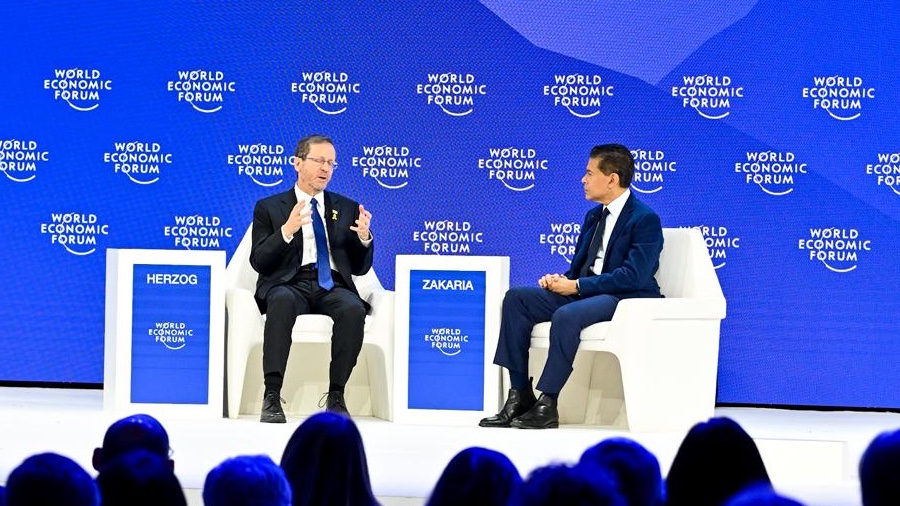(JNS) When Israel needed help most, America stood by its side—militarily, economically, diplomatically—while much of the world turned its back or lined up against it. Israel, however, paid a heavy price for two years of war. The illusion of self-reliance was shattered. As much as Israeli Prime Minister Benjamin Netanyahu may protest, it has never been clearer that Israel is a vassal of the United States. Ironically, the man most responsible is supposed to be the most pro-Israel president in history.
While every American president sometimes pressured Israel behind closed doors, Donald Trump has bragged about publicly dictating policy to its leaders. After Netanyahu ordered the conquest of Gaza City as part of his plan to fight until Hamas was destroyed, Trump said to TIME magazine: “I stopped him, because he would have just kept going. It could have gone on for years … . And I stopped him.”
If Hamas refuses to disarm, Trump said in another interview that “Israel will return to those streets as soon as I say the word.” He added, “I had to hold them back. I had it out with Bibi,” the prime minister’s nickname
Trump even claimed personal credit for Israeli military operations, saying of Israel’s airstrikes and military operations, including “the pagers and all that stuff” against Hezbollah terrorists in Lebanon, was “done in auspices with, actually, with me directly.” He added that “they let me know everything. And sometimes, I’d say no, and they’d be respectful of that.”
Israel and its supporters complained about Democratic presidents interfering in domestic Israeli affairs; however, Trump has gone further than that. He told the Knesset that Israel’s president should pardon Netanyahu and suggested—astonishingly—that he might intervene in Netanyahu’s corruption trial “to help him out a little bit.”
Trump’s interference didn’t stop at the Gaza Strip. It extended to Israel’s northern and eastern fronts. He ordered the recall of Israeli fighter jets headed for Iranian targets and forced Netanyahu to apologize to Qatar’s emir. His commands halted Israel’s campaign against Hezbollah and derailed efforts to strike at the heart of the Iranian regime.
Although not directly related to the war, though happening against the backdrop, Trump became the first president to threaten the entire relationship if Israel did not obey him, telling TIME that if Israel annexed the West Bank, “Israel would lose all of its support from the United States.”
Like the Arabists of old, he made clear that America’s regional priorities—relations with the Arab states—and not Israel’s survival come first.
Trump did not go completely Arabist, as he resisted Arab pressure to force Israel to accept the establishment of a Palestinian state. Still, his 2020 Mideast peace plan called for just that, and in an interview with “60 Minutes,” he said, the future of the Palestinians is “gonna be up to Israel and other people—and me.”
Before Trump returned to office, relations with the Biden administration were fraught. Despite his emotional attachment to the Jewish state, the former president was frequently at odds with Netanyahu. He attempted, though meekly, to use arms as a lever. And at times, he micromanaged Israel’s military operations in Gaza and prevented Israel from mounting a major operation against Iran. By insisting that civilians be confined to the Palestinian enclave rather than evacuated to safety, former US President Joe Biden created the humanitarian crisis and contributed to the casualty toll, both of which were internationally blamed wholly on Israel.
Both presidents contravened Israel’s desired strategy of imposing a siege on Gaza out of concern over the impact on the civilian population.
Congress has remained solidly behind Israel throughout the war, though fissures have emerged. During Biden’s term, progressives accused him of complicity in “genocide,” while Republicans said he wasn’t pro-Israel enough. Under Trump, few in the GOP have dared to contradict him, while Democrats are increasingly moving toward open hostility. Senate Minority Leader Chuck Schumer’s unprecedented call for Netanyahu’s resignation last year signaled how far the bipartisan consensus has unraveled.
The deterioration extends far beyond Washington. Within the MAGA right, isolationists and “America First” populists are turning against Israel. On the far right, antisemitism—once a political taboo—is now often excused or ignored. Within the Democratic Party, hostility to Israel has metastasized, beginning with the indulgence of Reps. Ilhan Omar (D-Minn.) and Rashida Tlaib (D-Mich.), culminating in the election of New York state assemblyman Zohran Mamdani, a Socialist Democrat, as New York’s mayor.
Meanwhile, antisemitism has exploded across American society, masked as “anti-Zionism.” Universities became breeding grounds of moral hypocrisy, protecting every minority except Jews. Faculty and students openly celebrated the Hamas terror organization, while Jewish students were harassed and silenced. Alarmingly, the disease has spread to K-12 educators.
With professors using their platforms to indoctrinate students with hatred under the guise of “academic freedom,” it shouldn’t be surprising that, contrary to popular opinion, those with more education tend to be more hostile toward Israel. This is true even among Jews; a Washington Post survey in September found that 60% of Jews with postgraduate degrees disapprove of Israel’s military action in Gaza, a significantly higher rate than the 48% among those with bachelor’s degrees and 36% among those with less education.
The broader public is moving in the same direction. Gallup found that American sympathy for Israel—46%—is at its lowest point in 25 years. Support for the Palestinians has climbed to a record 33%. Democratic support for Israel has declined from 58% in 2014 to just 21% in 2025. During that period, their sympathy for the Palestinians increased from 23% to 59%. Support among Republicans has declined slightly, from 81% to 75%. The gap between Republicans and Democrats on sympathy toward Israel stands at a staggering 54 points.
In 2014, 74% of Democrats had a favorable opinion of Israel; in 2025, it dropped to 33%. For the first time, a majority of Democrats (60%) rated Israel unfavorably. Independents also see Israel less favorably since the war started in Gaza, falling from a high of 76% in 2021 to 48% in 2024.
There was an equally marked difference in sympathy for Israel versus the Palestinians among Gallup respondents in different age groups: 18- to 34-year-olds favored the Palestinians 48% to 29%, 35- to 54-year-olds were nearly the opposite, preferring Israel by 45% to 33%. Those over 55 sympathize with the State of Israel by 56% to 27%. According to Gallup’s Frank Newport, younger Americans are driving the trend away from support for Israel. That shift among the youth is also showing up among Israel’s traditionally loyal evangelical base.
Demographic trends portend trouble ahead. Newport noted that the number of Israel’s strongest supporters—religious and older Americans—is declining while the fastest-growing segments of the population—young and secular Americans—are increasingly sympathetic to the Palestinians.
The same divisions plaguing the wider public also run through the Jewish community. Many American Jews, already critical of the Netanyahu government over its attempts at judicial reform, rallied behind Israel after Oct. 7. Yet those original fault lines very quickly reappeared. A significant number of American Jews, especially liberals, objected to Israel’s approach to fighting in Gaza. While operations in Lebanon and then later, Iran, drew minimal criticism, the widespread documentation of Palestinian civilian casualties and suffering caused many American Jews to turn against the Gaza operation, mirroring global disapproval.
A September 2025 Washington Post poll had the shocking finding that 61%of American Jews believe Israel has committed war crimes, and 39% say the country is guilty of genocide. By 48% to 46%, Jews disapproved of Israel’s military action in Gaza. Democrats and young Jews (18 to 34) disapproved by 63% and 57%, respectively. By comparison, 85% of Republicans (a small percentage of the community) approved. American Jews still feel a strong attachment to Israel, but 48% are critical of Netanyahu’s leadership. In 2020, 40% rated his leadership favorably compared to only 32% today. Further, 86% blamed Netanyahu for continuing the war. “Younger Jews,” the Post noted, “increasingly separate their Jewish identity from the Israeli government, saying Israel ‘does not speak for them.’ ”
Israel must reclaim its independence. It survived the war, even excelling militarily, but is now tethered to an unpredictable ally whose support comes with humiliating conditions and whose electorate is steadily losing interest in maintaining the bond. Trends in demographics (including within the Jewish community), Democratic Party politics, higher education and public opinion should set off alarms in Jerusalem.
If Israel’s leaders take no lessons from this, the damage could become permanent.
Want more news from Israel?
Click Here to sign up for our FREE daily email updates















Politicians, educators and journalists, will have more to give account for than just about anyone else of the people who stand in judgement on judgement day.
Politicians – for letting their ego’s guide them instead of truth and truth from the word of God. Also, I believe from taking bribes, bribes you say? lobbyists are the biggest bribers on the planet.
Educators – who teach hatred instead of truth.
Journalists – who push lies instead of truth, because they get paid more for pushing the lies and pushing the lies because they prefer to do so.
The majority of these three people groups do not believe in God, because they believe in themselves more. These three groups cause more of the violence on the planet than many other groups of people, there are others doing the same but they get their start from the top three groups.
It would sure be a nice world to live in if lies weren’t favored over truth.